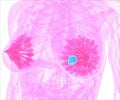Exciting research shows a powerful oral drug, combined with standard treatments, overcomes hormone resistance in breast cancers.

The Efficacy of CB-103, a First-in-Class Transcriptional Notch Inhibitor, in Preclinical Models of Breast Cancer
Go to source). CB-103 is a small molecule Notch inhibitor invented by Cellestia. Notch receptors relay information from the cell surface to the genes, and Notch signaling plays an important role in many different cancers, including breast cancers, where its role was originally demonstrated by the Miele laboratory.
‘Breakthrough study demonstrates the synergy of an investigational oral medication with standard therapies, reversing hormone resistance in Estrogen-Receptor Positive (ER+) and Triple-Negative Breast Cancers (TNBC) experimental models.
# Breast Cancer, #Hormone Resistance, #Triple-Negative Breast Cancers
’





Based on their prior research, the LSU Health team believed this compound should be safe and effective in hormone-resistant estrogen-receptor-positive breast cancers and proposed the study for this indication to Cellestia.“Over the past two decades, various drugs targeting the Notch signaling axis have been investigated,” notes senior author Lucio Miele, MD, Ph.D., Professor and Chair of Genetics and Assistant Dean for Translational Science at LSU Health New Orleans School of Medicine.
“CB-103 is a next-generation, orally active, clinical-stage drug that, unlike older drugs, directly targets gene regulation by Notch and offers a much-improved toxicity profile.”
Oral Drug Combo Targets Hormone Resistance in Breast Cancer
"The safety and efficacy of CB-103 in Notch-dependent advanced, metastatic solid, or hematological malignancies have been investigated in a multi-center international phase I/II clinical trial,” adds Samarpan Majumder, Ph.D., Assistant Professor of Genetics at LSU Health New Orleans School of Medicine and one of the senior authors of the paper.“CB-103 has been safe and well-tolerated, showing minimal gastrointestinal toxicity, unlike previous Notch inhibitors."
Despite recent advances in the treatment of estrogen-receptor-positive breast cancers, endocrine resistance ultimately develops.
Advertisement
Patients with early TNBC have a two- to three-fold higher risk of disease recurrence and death in the first three years after diagnosis. TNBC disproportionately affects young premenopausal women and African American women.
Advertisement
Reference:
- The Efficacy of CB-103, a First-in-Class Transcriptional Notch Inhibitor, in Preclinical Models of Breast Cancer - (https://www.lsuhsc.edu/newsroom/LSU%20Health%20Research%20Suggests%20A%20New%20Approach%20For%20Treatment-Resistant%20Breast%20Cancers.html)
Source-Eurekalert














